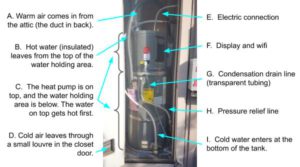Water Heater Replacement a Capital Improvement
When you need hot water to take a shower, wash clothes or do dishes, your household relies on its water heater. The unit has one primary function, which it performs pretty well most of the time: to heat up gallons of water that are then moved through your plumbing system and into your home. But as with any appliance, the water heater does eventually wear out or start having issues that can make it stop working.
Depending on the type of issue your water heater replacement is having, it may or may not be time to replace the unit. For example, if you hear strange knocking, hissing, or rattling noises coming from the tank, it could be a sign of rust or sediment build-up that can be fixed with flushing the water heater.

On the other hand, if the water heater starts making loud, rumbling sounds and produces scalding hot (or cold) water, that’s a clear sign it is time to replace it. These problems are usually caused by the water heater’s heating element or the bottom of the tank burning out and need to be replaced.
Is Water Heater Replacement a Capital Improvement?
Water heaters have a lifespan of 8 to 12 years. However, they can also wear out sooner than that if you don’t maintain them properly. For instance, manufacturers recommend flushing the tank every year to remove accumulated sediment from the unit.
In addition to maintenance, you can also keep your water heater running longer by checking the electrical breakers and thermostat. A blown fuse or a tripped circuit breaker may cause the unit to shut off. In addition, if you notice that it takes longer than usual for your household to get hot water, that’s probably another sign it’s time for replacement.
The IRS defines capital improvements as long-term changes that increase the value of a property or change its use. This can include structural changes, such as building an extension or adding a garage, or it can be things like installing new appliances and plumbing fixtures. These expenses can also be eligible for tax deductions when you sell the property.
You can often get the funds to pay for capital improvements, such as a water heater replacement, through a personal loan. This is an unsecured form of borrowing that doesn’t require securing the debt with your property and will only charge you interest on the amount that you borrow. You can usually find an online lender that offers personal loans to individuals or small businesses.